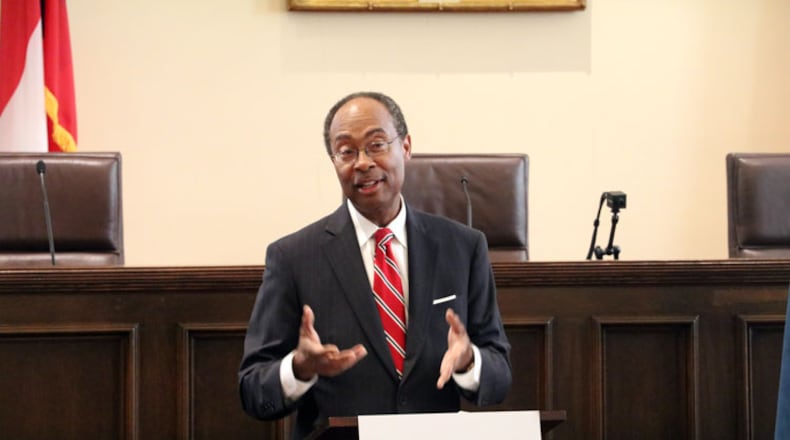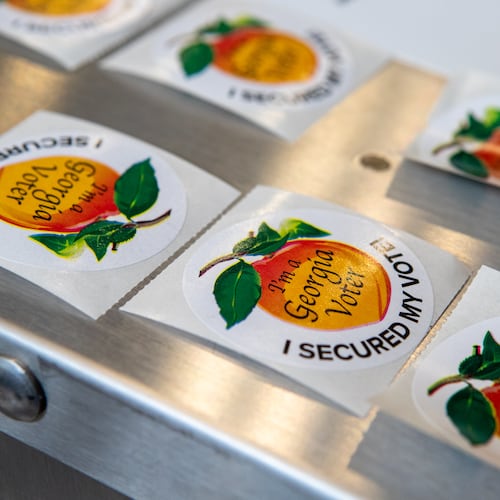Highly respected U.S. District Judge Steve Jones recently announced that he would assume senior status in the Northern District of Georgia on Jan. 1. Because this is an election year, president Biden must swiftly nominate a replacement. Before that happens, though, Georgia’s two senators will accept applications for the seat.
Jones, who is 67 and began service in 2011, became eligible for senior status, a form of semiretirement, under the “Rule of 80,” which provides that active federal judges may take senior status when they reach 65 and have served 15 years. Many senior jurists carry fewer cases (usually a half load) than active judges.
Senior status affords valuable benefits. It enables the court system to retain the skills and experience that jurists acquire during active service and to capitalize on the fresh perspectives that new judges can supply. The practice also rewards jurists for dedicated public service at salaries below what most could have earned in a private law practice by compensating the judges at full pay except for cost-of-living adjustments and by reducing their caseloads.
Credit: Handout
Credit: Handout
Jones is a very experienced jurist. Across Northern District service, he has resolved much high-profile litigation. In Georgia’s election subversion cases, the judge denied 2023 requests by former president Donald Trump’s chief of staff Mark Meadows and former Trump assistant attorney general Jeffrey Clark seeking their cases’ removal to federal court. Texas law professor Steve Vladeck praised Jones’ “by the book” treatment. In 2020, Jones blocked Georgia’s six-week abortion ban, which took effect after the U.S. Supreme Court overturned Roe v. Wade. Jones later ordered GOP lawmakers to redraw Georgia’s legislative maps after concluding the district lines unlawfully diluted Black voting strength, but he rejected a 2019 case that sought to restore voting rights of 98,000 individuals a Georgia statute removed from the rolls.
When announcing his transition, Jones stated his goal and practice were to ensure that everyone has a “day in court, is treated fairly, is given respect, and receives an explanation for [his] decisions.” He similarly found “most satisfying” litigation’s expeditious completion, so parties receive answers to legal questions they raise, and deemed most challenging insuring that litigants receive timely resolution,” due process and sufficient preparation time.”
Shortly after Jones announced his status change, U.S. Sens. Raphael Warnock and Jon Ossoff expeditiously publicized the vacancy application procedure. The confirmation process has traditionally slowed during federal election years. However, that is unlikely to occur in 2024 and did not happen in 2020 and 2022. Ossoff serves on the Judiciary Committee.
Ossoff and Warnock helped confirm Eleventh Circuit Judge Nancy Abudu, who succeeded retiring Judge Beverly Martin, and Northern District Judges Victoria Calvert and Sarah Geraghty, who succeeded Thomas Thrash and Amy Totenberg when they became senior jurists. Georgia’s senators need to pursue candidates who are well-qualified, mainstream, intelligent, diligent, ethical, independent and diverse in terms of ethnicity, gender, experience and ideology.
Applications are due June 3, after which the senators’ vetting committee will conduct interviews and make recommendations to the lawmakers, who then will provide President Biden with suggestions. These processes must be expeditious, even though election years mean that senators convene in Washington less frequently because they are campaigning, either for themselves or for colleagues or the president. The process needs to move fast because the party out of power in the White House and the Senate majority hopes to capture both so that it can appoint judges. Those dynamics incentivize the party to thwart nominations so that a new president or new majority could fill the vacancy.
The Warnock-Ossoff vetting committee must quickly scrutinize applications, interview candidates and make recommendations to the senators. Warnock and Ossoff should provide suggestions to Biden in June. He must rapidly nominate a candidate so that the Judiciary Committee can conduct a July confirmation hearing. When the Senate returns from the August recess, the panel should promptly discuss the nominee and vote. The Senate must then swiftly convene a cloture ballot, confirmation debate and vote.
Carl Tobias is the Williams Chair in Law at the University of Richmond in Virginia.
About the Author
Keep Reading
The Latest
Featured




